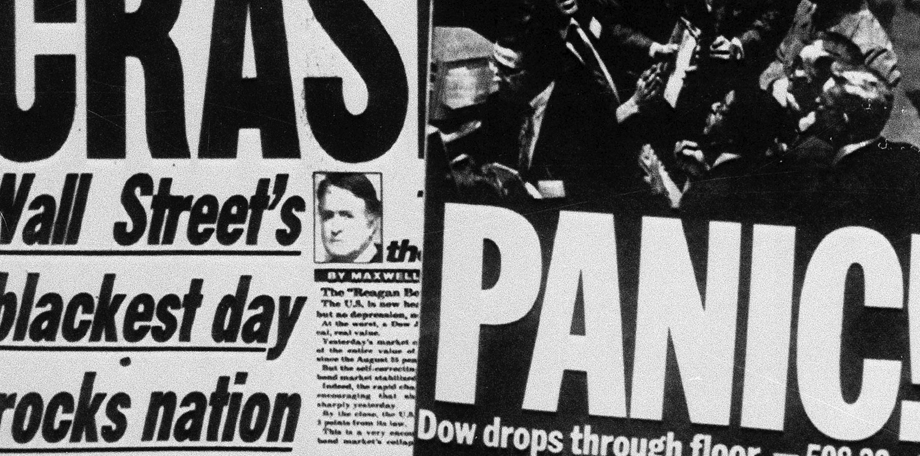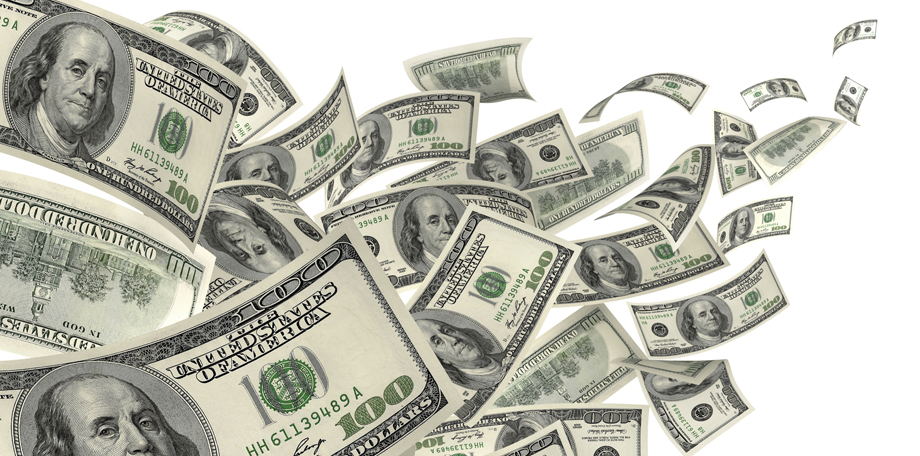There are events that happen in the world that impact us socially, emotionally, financially, and physically, and they can be pretty profound. But they are also opportunities to grow and learn, both personally and professionally.
A Little Financial History
Most of you reading this article are too young to remember being impacted by “Black Monday” in 1987 when the Dow dropped one quarter of its value in one day. It’s still a record, as nearly a trillion dollars of wealth was wiped out in just one day.
That was the first big financial shakeup of my lifetime, but the Great Recession of 2008 pulled the rug out from beneath many Americans. The collapse of the housing market which was fueled by low interest rates, easy credit, insufficient regulation and toxic subprime mortgages led to the economic crisis. For the first time, security and comfort became an illusion. We looked at our spending and savings a lot differently after 2008.
Today, we are struggling to recover from a 2+ year-long pandemic, face a contentious political landscape, never-before-seen supply chain issues, and there is war in the Ukraine.
All of these events have an impact in our lives, whether we are conscious of them or not, because they shape us as humans. In 2008, the insecurity forced us to pay attention to our finances more, and in 2020, the unprecedented times of a global pandemic made us pay attention to our bodies more. But millions of Americans are still feeling financial disruptions due to the pandemic, whether it’s due to a loss of a job, furlough, loss of bonus or incentive pay, career change or adjusted budget for spending.
Related: A Pandemic of Financial Anxiety
Current State of Affairs
A recent study by Morgan Stanley compiled responses from 1000 employed U.S. adults and 600 HR executives and shows employees’ financial stability took a hit during the pandemic. Here are some interesting stats from the study:
- 91% of those surveyed report having faced personal finance challenges, such as household budgeting, debt reduction and emergency and short-time financial savings.
- 64% of employees report that these stressors negatively impacted their work and personal life, while 82% of employers are concerned that personal financial issues affect work productivity.
- More than 4 in 5 employees believe that employers should be involved in helping employees understand how to maximize their financial benefits.
- 95% of HR executives say that re-evaluating their companies’ 2022 benefits package is a moderate to high priority.
Beneath Money Habits are Values
Whether you are a spender or a saver doesn’t really matter; there’s no judgment here. But it’s important to understand that underneath our money habits are our belief systems of values. If you value security, you likely save your money. If you value status or power, you may spend money on the objects that you feel elevate your status or power relative to other people, such as a nice car.
You can understand what someone’s values are by watching how they spend their money:
- Do they save for upcoming events like their child’s college education?
- Do they purchase material objects like houses and furniture?
- Do they prefer to spend their money on life experiences like travel?
But belief systems can change. Let’s say you have an event happen that you are unprepared for that financially that shakes your world. Whether you lost your job, your home or your investments, this would be considered a catastrophic loss and could cause a dramatic shifting of belief systems.
Think back to older generations who lived through the Great Depression. They were always worried about money and were hesitant to spend it. Despite what may have happened later in their lives, they never felt financially secure because of the hardship they endured earlier in life.
Retraining Myself about Money
I speak from experience when talking about changing a belief system around money. My family had no money when I was growing up. My mom went into a mental hospital when I was just 18 months old, and my dad literally lived paycheck to paycheck. In fact, he didn’t even have a bank account. Needless to say, growing up in an environment like this created financial anxiety and a strong interest to make and save a lot of money.
When I became a trader and went onto the floor, I was around wealth for the first time in my life. I recognized that other traders had different beliefs about money. I was very conscious about not having enough, whereas they held money wildly differently. The smaller traders (those without a lot of money) tended to be more fearful about losing money, but the traders who already had money expected to make even more. They were very resilient and came back quickly even if they suffered a loss. They understood money comes and goes.
I wanted to create wealth in my life but didn’t know any way other than being uber-conservative with my money. So, my first year out of college, I saved a ridiculous amount of money – well over 50% of my salary. I fixated on how to not spend money. I sacrificed to save and would often even walk long distances instead of taking public transportation.
But after watching these larger traders work the floor, I realized that my perception was not how people who had money thought. I realized I needed to change my beliefs about money and lessen the anxiety. So, I started an experiment to teach myself how to let go of money as if I already had enough, or even more than enough. Each day on my way to work, if I saw a homeless person on the street, I would give him or her $20. Now, this was a big deal to someone just starting out after college with a small salary. At first, it was very hard to do because I was often giving away $20 to $40 a day! But after doing this for a few months, I was able to realize that even after giving away thousands of dollars, I was still okay financially. This exercise taught me how to get into the flow of letting money go at the same time I was receiving it (i.e. my paycheck) so that there was more balance. To this day, I still live in that flow: I save a lot and I give away a lot.
This was a conscious decision I made in my life, and it wasn’t something learned from my parents. Most people tend to have the same financial belief system as their parents. If your parents lived paycheck to paycheck, you will have a tendency to do that. If they were disciplined savers, you will likely lean toward savings rather than spending. If they were frugal and fearful, there’s a chance you will also live this way.
I realized my propensity to hoard money due to my upbringing and changed it. There’s no question in my mind that without re-programming my belief system around financials, I wouldn’t have ended up the person I am today.
Define your Financial Belief System
If your belief system is not in alignment with who you want to be or how you want to live your life, you have to start that work from the inside out. Ask yourself:
- What financial situation are you currently going through?
- If you have choices or limitations, where do you place your money?
- What events in your life have shaped your feelings around finances?
- Is that the belief system you want to have right now?
The other question you should ask yourself is: what does having a lot of money mean to you? The answer will be different for everyone. For some people, it’s about power and status. For another, it’s security and comfort. For another, it’s freedom. Self-reflect on this question carefully, because it will help you make choices consciously, rather than being driven by impulses.
Frugal to a Fault
I once worked with an executive coaching client who grew up in a family with immigrant parents. They ended up losing their business, so Mary (not her real name) faced challenging times growing up. As an adult, she was also very frugal, and it was starting to impact her happiness, well-being, and marriage.
A simple purchase would be agonizing for Mary, especially if it was expensive. So, we worked on getting her conscious of her financial belief system and a willingness to adapt it. After a few weeks, she was able to make a larger purchase of a new expensive dining room table.
She was able to do this because she realized the meaningfulness of that table and the value it would bring to her family. She envisioned her children growing up around this table, sharing meals and conversations for many years to come. The table took on a different value once she realized its potential, and she was able to not fixate on the price, but rather realize how special it was. In this case, Mary was able to change the belief system she inherited from her family to become comfortable with spending money to enhance her own family’s lives.
Money is Complicated
Money tends to bring up a lot of emotions for people, and that’s okay. Our relationship with money is personal and can be compared to our other relationships at home and work. If you need to change your mindset about financial decisions, investigate your feelings, emotions and moods about money. Understand who you are and what you want your life to look like.
By getting conscious and understanding yourself first, you can then choose how you want to use the instrument of finance for your life and your family.
If you need help defining and perhaps reevaluating your financial belief system, an executive coach can help.
Learn more about Executive Coaching




